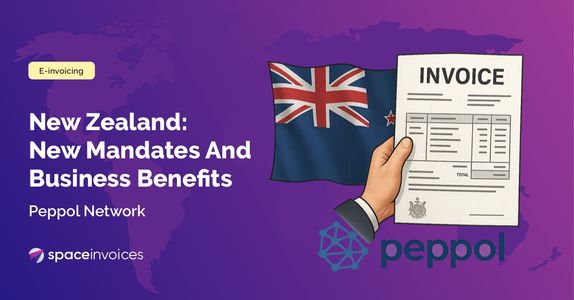Peppol in New Zealand: New Mandates And Business Benefits
Staying compliant used to be a tax-season headache. Now, it’s becoming a daily requirement. With e-invoicing mandates and Peppol gaining traction, New Zealand businesses can’t afford to ignore the shift.
In this blog, you’ll learn what Peppol is, how it works, and why adopting it early could give your business a strategic edge—before mandatory rules hit. From real-time payment benefits to cross-border simplicity, here's everything you need to know to get started:
What Is Peppol?
Peppol is a global framework allowing an exchange of electronic documents, mainly invoices, between businesses and government entities, closely followed by B2B. Its goal is global compliance, allowing anyone to connect and issue on the other side of the globe, with no problem as it will be standardized and a secure network.
In New Zealand, the Ministry of Business, Innovation and Employment (MBIE) serves as the Peppol Authority, managing its implementation and governance. MBIE also collaborates closely with the Australian government to align standards and simplify cross-border invoicing.
You can find more on the official site: www.einvoicing.govt.nz.
How Peppol Works
Peppol is just a safe and standardize network, so the process is really simple. Once the sender’s e-invoicing software creates and validates the e-invoice, it’s transmitted through the Peppol network via the sender’s accredited access point. The buyer’s system then receives it through their own Peppol access point.
These access points communicate securely over the Peppol network, ensuring standardized and reliable data exchange.
In some countries, the e-invoice may also be real-time reported, digitally stamped, and checked for compliance while in the network, as Peppol is government-regulated.

Why Peppol Matters To New Zealand Businesses
Even though e-invoicing and Peppol aren’t yet mandatory for B2B in New Zealand, many companies are already taking advantage of the benefits:
Current Status and Future Outlook
In New Zealand, current regulations require only central government agencies to have the capability to receive e-invoices. While it’s not yet mandatory for B2B or B2C, adoption is strongly encouraged.
Starting 1 January 2026, any agency that issues or receives more than 2,000 domestic invoices per year must implement an e-invoicing system.
All signs point to e-invoicing becoming mandatory eventually—and businesses that adopt it early can not only stay ahead, but also leverage it as a competitive advantage or even a new revenue stream.

How To Start E-invoicing Through Peppol
You can’t integrate directly with Peppol, you need software that supports it and, more importantly, handles e-invoicing. Here are the four key steps to get started:
Start E-invoicing In Less Than A Week
Space Invoices is both an invoicing API and a Peppol Access Point Provider, helping you stay compliant with current and upcoming regulations in New Zealand—and in 70+ other countries worldwide:
Do you have questions about New Zealand compliance?
We are ready to help.
Additional reading:
Start issuing Invoices, free!
Signup and start issuing compliant invoices from your software in minutes.
Or contact us to get a free implementation consultation.
